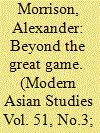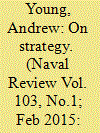| Srl | Item |
| 1 |
ID:
153584


|
|
|
|
|
| Summary/Abstract |
Drawing on published documents and research in Russian, Uzbek, British, and Indian archives, this article explains how a hasty attempt by Russia to put pressure on the British in Central Asia unintentionally triggered the second Anglo–Afghan War of 1878–80. This conflict is usually interpreted within the framework of the so-called ‘Great Game’, which assumes that only the European ‘Great Powers’ had any agency in Central Asia, pursuing a coherent strategy with a clearly defined set of goals and mutually understood rules. The outbreak of the Second Anglo–Afghan war is usually seen as a deliberate attempt by the Russians to embroil the British disastrously in Afghan affairs, leading to the eventual installation of ‘Abd al-Rahman Khan, hosted for many years by the Russians in Samarkand, on the Afghan throne. In fact, the Russians did not foresee any of this. ‘Abd al-Rahman's ascent to the Afghan throne owed nothing to Russian support, and everything to British desperation. What at first seems like a classic ‘Great Game’ episode was a tale of blundering and unintended consequences on both sides. Central Asian rulers were not merely passive bystanders who provided a picturesque backdrop for Anglo–Russian relations, but important actors in their own right.
|
|
|
|
|
|
|
|
|
|
|
|
|
|
|
|
| 2 |
ID:
106614


|
|
|
|
|
| Publication |
2011.
|
| Summary/Abstract |
Al Qaeda has developed a coherent strategy for insurgent violence that has much in common with the focoism advocated by Che Guevara in the 1960s. In their strategic writing, explored here, key Islamist strategists stress the role of violence in creating revolution, and describe the export of committed fighters to focoist enclaves at the margins of enemy control. In contrast to some prominent themes in recent scholarship, the article argues that physical space is demonstrably important to the revolutionaries, that their development of leaderless jihad is designed to supplement not replace territorial control, and that their violence is avowedly strategic.
|
|
|
|
|
|
|
|
|
|
|
|
|
|
|
|
| 3 |
ID:
138012


|
|
|
|
|
| Summary/Abstract |
In the first of a series of four articles, the author examines some of the pitfalls and issues facing modern strategists, whether military or civilian. He begins with an exploration of strategy through its evolution, definitions, and some of the tensions in the politico-military continuum. He uncovers causes of friction in the remarkable trinity of passion, chance and reason, and identifies sources of evidence to aid us in our education.
|
|
|
|
|
|
|
|
|
|
|
|
|
|
|
|
| 4 |
ID:
133560


|
|
|
|
|
| Publication |
2014.
|
| Summary/Abstract |
This is a review article of two books that respond to convergences and turning points in how societies undergoing peacebuilding processes respond and engage with such processes. The two books demonstrate that these interventions are not an overpowering and coherent strategy, and even less so a practice. They suffer constraints and blowbacks in such a way that their moral, political and even military power is not as hegemonic or universally applicable as it was once portrayed in the literature. The different use of 'challenges' and 'resistance' to conceptualise these constraints and blowbacks points to the need for further research on how different actors interact beyond their role as interveners, peacekeepers or local actors.
|
|
|
|
|
|
|
|
|
|
|
|
|
|
|
|